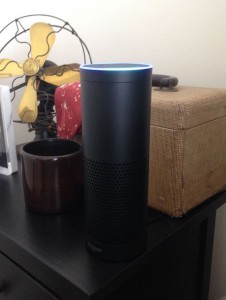 I enjoy technology as much as anyone, but I’m usually happy to wait until version 2.0 before laying out my money. But I took a leap with the Amazon Echo, a Bluetooth speaker with a voice interface and Siri-like artificial intelligence built in. Yes, I thought it would be nice to have around the house, and yes, it might be fun to play with. But I also believe that our future tech will veer away from screens, and wanted to see how far we’ve come.
I enjoy technology as much as anyone, but I’m usually happy to wait until version 2.0 before laying out my money. But I took a leap with the Amazon Echo, a Bluetooth speaker with a voice interface and Siri-like artificial intelligence built in. Yes, I thought it would be nice to have around the house, and yes, it might be fun to play with. But I also believe that our future tech will veer away from screens, and wanted to see how far we’ve come.
The answer is: we’ve come a ways, but have far to go. But I still really like the Echo. Here’s my experience so far:
Echo ships in an elegant black package that’s worthy of Apple’s great packaging. To use it, you plug it in, install the Echo app on your smartphone, link it to your Amazon account and Wifi network, and then you’re set. You can use the app to create additional functionality by linking it to services like TuneIn Radio, Pandora or IHeartRadio. Echo is a bit bigger than a can of tennis balls, but it’s solidly built. It features a distinctive LED light around the top which lights up when it’s communicating with you.
You don’t so much train Echo as it trains you. It quickly becomes clear what Echo can and can’t do by voice command. As long as you stay in its sweet spot, you’re fine. Here’s what it does: tell time, serve as a timer, play music (from the vast Amazon Prime library), play radio stations (via TuneIn Radio), offer a “Flash news” broadcast (from NPR or the BBC), look up things on Wikipedia, play music from Pandora and IHeartRadio. It also does some parlor tricks (tells jokes and answers trivia questions). You get Echo’s attention by using it’s “wake” word, which by default is “Alexa” (such as, “Alexa, play some Wilson Pickett”).
Echo hears your commands easily and executes tasks quickly. It uses an array of seven microphones to hear you, even from a distance in a noisy room. As for its sound, it’s pretty good, better than any clock radio you may have, but not loud enough or hi-fi enough to be a primary audio source. I recommend it for bedroom, kitchen or office use.
So why am I interested in this? The hardware is good, but the software has limitless potential. Amazon just announced Echo integration with Belkin WeMo and Philips Hue lighting, so you can now use Echo as a smart home hub. What else could it do? It all depends on Amazon’s ability to get third-party buy-ins. There’s no technical reason why Echo can’t control a Sonos whole-house audio system or a Nest thermostat. Through software updates, Echo could potentially become a universal voice hub.
If you don’t like voice control, you can also control Echo through the smartphone app. This is also where you provide provide account linking.
I believe that voice technology is the key to unlocking internet services in cars, operating rooms, and anyplace else where your hands or eyes are occupied on some other, more important task. The technology also has tremendous promise for the elderly and people living with disabilities.
The Echo is currently available to Amazon Prime members for $149 (the early adopter price for Prime members was $99). If you’re not a Prime member, it’s $199.
UPDATE 4/17/2015 – I purchased a Belkin WeMo Insight switch for $55, and quickly got it running and connected to the Echo. Once configured, it permits voice control of anything that’s plugged in to the switch. If you walk in the front door laden with groceries, it’s nice to be able to say, “Alexa, turn the lights on.” The Belkin switch offers additional functionality (such as timer control or “away” settings for your lights, via the WeMo app). The Insight switch also monitors energy use through the switch.
Pros: elegant package, easy setup, good sound, innovative voice control, comes with voice-capable remote, future upgradability via software updates.
Cons: there are better Bluetooth speakers available, requires WiFi and AC power (no battery), could use an audio input jack (so you can play computer audio) and an output jack (so you can voice control your stereo rig), limited by Amazon’s ability to get third parties to cooperate (good luck getting Apple and Google to support it). Amazon currently won’t post user reviews of Echo, which undermines consumer trust in the technology.
Read more:
Echo page on Amazon.com
ZDNet, Amazon Echo review: a perfect 10
TheVerge, Amazon Echo review: listen up
TechCrunch, Amazon Echo can now control your smart home
[…] course, unlike the past, according to David Kamerer‘s blog, Amazon Echo now has a lengthy section for skeptical users to read through hundreds of […]